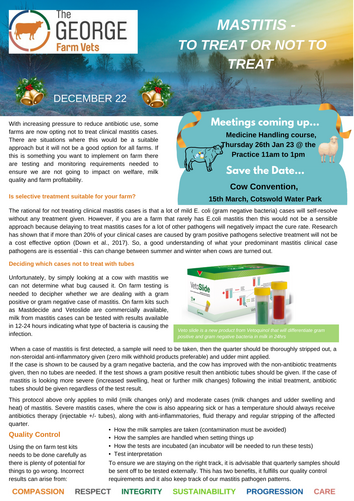News
 FULL MASTITIS NEWSLETTER HERE - CLICK TO VIEW
FULL MASTITIS NEWSLETTER HERE - CLICK TO VIEW
With increasing pressure to reduce antibiotic use, some farms are now opting not to treat clinical mastitis cases. There are situations where this would be a suitable approach but it will not be a good option for all farms. If this is something you want to implement on farm there are testing and monitoring requirements needed to ensure we are not going to impact on welfare, milk quality and farm profitability.
Is selective treatment suitable for your farm?
The rational for not treating clinical mastitis cases is that a lot of mild E. coli (gram negative bacteria) cases will self-resolve without any treatment given. However, if you are a farm that rarely has E.coli mastitis then this would not be a sensible approach because delaying to treat mastitis cases for a lot of other pathogens will negatively impact the cure rate. Research has shown that if more than 20% of your clinical cases are caused by gram positive pathogens selective treatment will not be a cost effective option (Down et al., 2017). So, a good understanding of what your predominant mastitis clinical case pathogens are is essential - this can change between summer and winter when cows are turned out.



